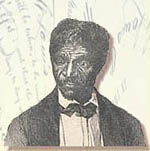DRED SCOTT
 Dred Scott |
| Dred Scott was an African�American slave in the United States who unscccessfully sued for his freedom and the freedom of his wife and two daughters. This case was was called the Dred Scott v. Sanford case in 1857 or simply the Dred Scott Decision. His case was based on the fact that although he and his family were slaves they had lived with their master in states and territories where slavery was illegal. Therefore they were no longer subject to the laws of slave states. He had been encouraged to return to a slave state to sue. This was evidently and courageous act or some would say a foolish act. Foolish because he had to give up his freedom and return to a slave state in order to sue therefore giving up his freedom. On the other hand it can be said that his deed was that of a courageous person who had his people�s liberty at heart. In any case he lost his case. The Supreme Court stated that since Scott was not a citizen of the United States he could not sue in any United States court. Based on that Scott lost the case. Moreover, the court further stated that Scott's temporary residence outside Missouri did not bring about his emancipation under the Missouri Compromise, which the court ruled unconstitutional as it would improperly deprive Scott's owner of his legal property. Here is where the case should have ended, but Chief Justice Roger Taney had an ax to grind against freedom for Blacks. It was uncharacteristic for a court to go beyond their ruling and interject there personal and or political feelings. In essence, he stated that a slave owner had the right to take their property, including slaves, anywhere they wished in the country, free state or not, and not jeopadize losing their property. While Chief Justice Roger B. Taney had hoped to settle issues related to slavery and Congressional authority by this decision, it aroused outrage and deepened sectional tensions. President Abraham Lincoln's Emancipation Proclamation in 1863, and the post-Civil war Thirteenth, Fourteenth and Fifteenth amendments nullified the decision. |